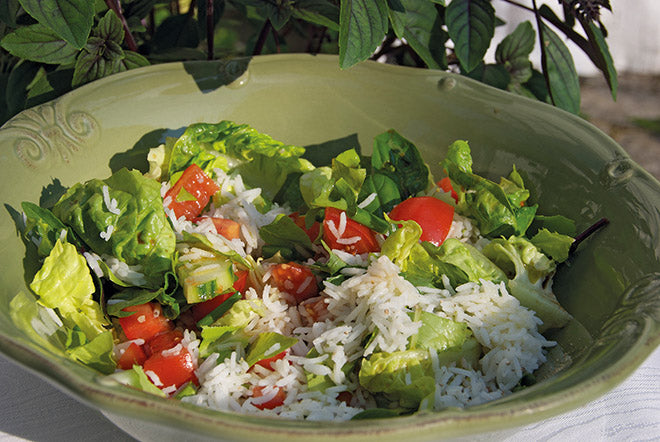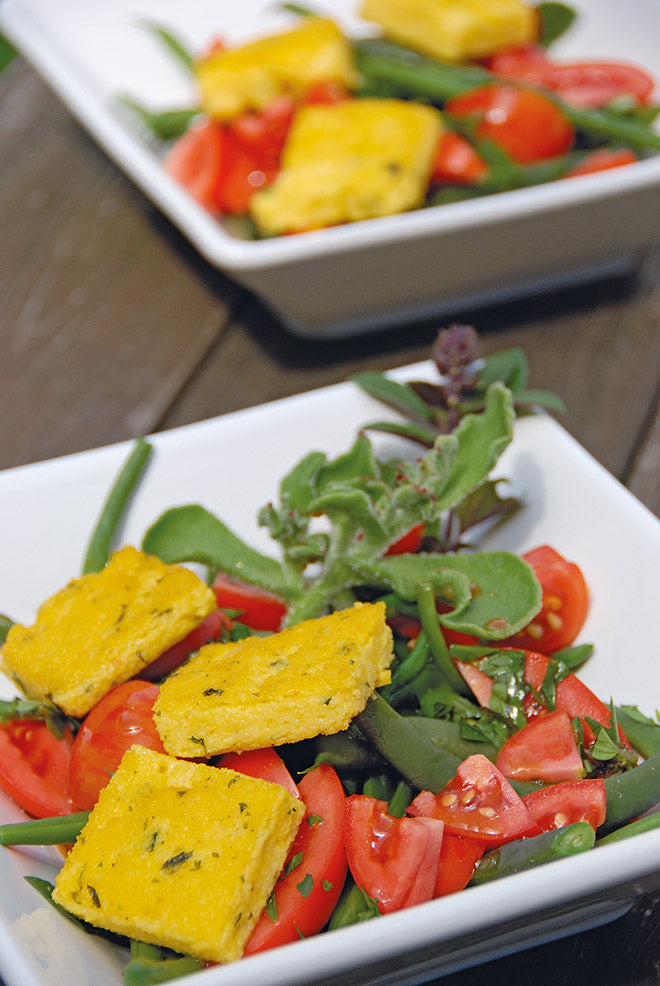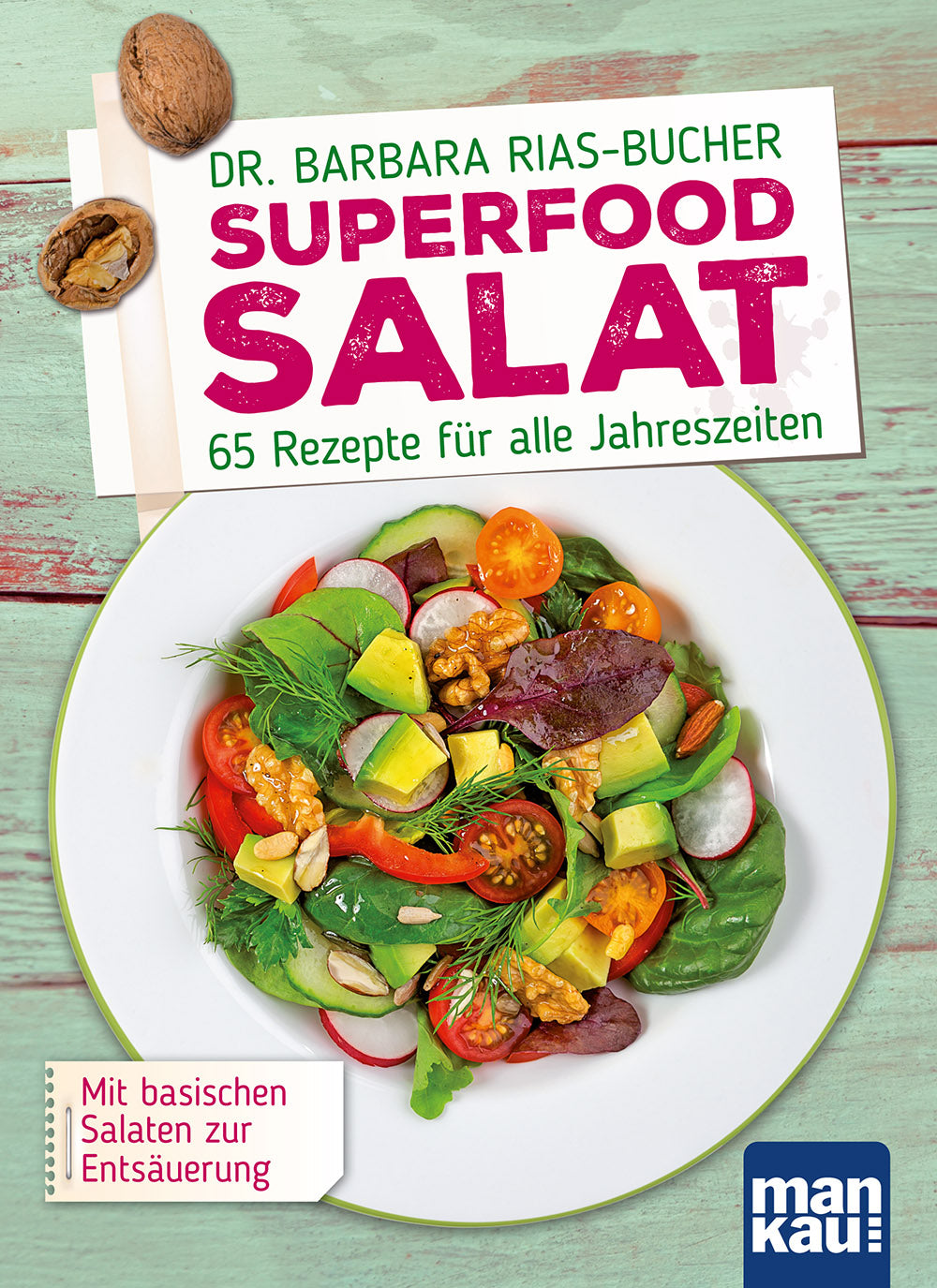
"Superfood salad: Our organism loves the healthy and fine balance of different colors and flavors!"
"Superfood salad: Our organism loves the healthy and fine balance of different colors and flavors!"
Interview with the renowned cookbook author and nutrition expert Dr. Barbara Rias-Bucher
"In modern, light cuisine, salad is no longer just 'green stuff', but a tasty mixture of colorful ingredients that ideally gently combines all five flavors - sweet, salty, spicy, sour and a little bitter - and thus gives our organism positive signals for our well-being. In addition, a well-mixed and varied salad provides us with plenty of vital substances and fiber, the latter in particular nourishing our important intestinal flora and keeping it healthy." The well-known nutrition expert Dr. Barbara Rias-Bucher, author of the guide " Superfood Salad ", describes in an interview why salad is an indispensable part of a healthy mixed diet and how many different ways it can be prepared and enjoyed."
The original origin of the word "insalata" has very little to do with what we now consider to be the epitome of freshness. How did salad become what it is and why is it so trendy?
Dr. Rias-Bucher: You are right: The Italian word insalata refers to salted food from the pantry that has been spiced up a little. Pickled vegetables were served with cold roasts, salted herrings were mixed with apples, onions and sour cream, and our grandparents' party salads consisted of nothing but canned vegetables with mayonnaise. A fresh salad was considered a secondary matter until around 40 years ago. Then, in the mid-1970s, it became fashionable: first because of the steak wave from the USA, which recommended a thick piece of meat and a large plate of salad as a slimming diet.
Then we experienced the beneficial influence of Mediterranean cuisine: what the appeals of nutrition experts had failed to achieve, the Italians, Greeks, Spaniards and later the Turks easily managed. Finally, the Germans discovered their love for fresh, raw and salady food, for antipasti, tapas and mezze - first on holiday, then in the many new restaurants that our first migrants opened in Germany. I remember it so well because I have always been a salad fan - at home we always had a big bowl of salad for lunch - and now I was also getting my money's worth when eating in an "Italian" or "Greek" restaurant. Today, salad is trendy because very few of us have to do hard physical work anymore; we therefore no longer need lavish meals. Salad is light, fresh and just right for modern people who want to eat low-meat or completely vegetarian.
You describe salad as a pure “superfood” for body, mind and soul. What is so special about this “green stuff” that was once laughed at as a mere side dish?
Dr. Rias-Bucher: The balance of different flavors and colors, because - if you'll allow me to contradict you - salad is by no means just "green stuff" anymore; that was once the case. Today, a real salad is a colorful mixture of ingredients that ideally combine sweet and sour, spicy and salty. Good salad also adds spice and a hint of bitterness, but just enough so that our tongue doesn't receive a warning signal of "be careful, poisonous." Our sensory cells in the mouth recognize these five flavors and provide us with unconscious information for our well-being: sweet taste helps us recognize energy-rich food, salty foods help us detect vital sodium ions, sour flavors stimulate the appetite on the one hand, but in higher concentrations warn us of spoiled food. Spicy taste, which experts define with the term umami and which is found not only in meat and soy sauce, but also in cheese, for example, tells us that foods are high in protein. The perception of bitterness is ambivalent: on the one hand, it aids digestion because bitter substances stimulate bile production; on the other hand, it is a possible protective mechanism that alerts us to poisonous food. So you see: a well-mixed and varied salad sends out positive "signals" to the organism. And the more different textures we can feel in our mouths, the greater the enjoyment.
The combination of colorful ingredients and the vital substances they contain is also very interesting from a nutritional point of view. What health-promoting effects can be proven in salads?
Dr. Rias-Bucher: A small salad before eating prepares the body for digestion, either through acid in the dressing or through bitter substances in the plant ingredients. Foods rich in fiber, such as Chinese cabbage, grains, wholemeal bread or potatoes, are quick and long-lasting filling; salad can therefore also contribute to a slim figure. Fiber also nourishes the intestinal flora, which stabilizes our immune system; the indigestible plant components are the main food of our "good" bacteria. And the better the food for these tiny helpers, the better we feel: body, mind and soul benefit from the healthy life in our stomach. Raw food and salad also ensure that we absorb vitamin C, for example, which is destroyed by cooking.
Finally, we also get a whole host of vital substances from the many herbs that make up a colorful salad: Dill regulates digestion, cares for the kidneys and bladder; nettles, dandelions and tarragon have a detoxifying effect; cress strengthens the immune system, chervil the heart - these are just a few examples of healthy active substances in salads. A large table of vital substances in my book gives you very detailed information on this.
Vegetables and salad are now also consumer products that are produced for the market under industrial-like conditions. Why should you make sure to go to an organic retailer as often as possible?
Dr. Rias-Bucher: It's not about possible harmful substances in food; this danger is usually overestimated in conventionally produced food. But organically grown food is more valuable because it usually contains more secondary plant substances than conventionally grown food. The reason: plants produce these bioactive substances to protect themselves against predators and harmful environmental influences such as infections or UV light. If you protect them against pests using pesticides, for example, they naturally produce fewer protective substances. It can be assumed that organic vegetables have a considerable concentration of active substances. In addition, the fresher the food, the better we use the bioactive substances in vegetables, fruit and herbs - another argument for buying from organic farmers and gardeners, many of whom also offer the opportunity to harvest vegetables and fruit yourself.
And I think there is another aspect that speaks in favor of organic food: people who farm organically make an important contribution to environmental protection and sustainability. We should honor that by buying their products.
As a self-sufficient person, you know that growing fruit, vegetables and lettuce in your own garden is often a lot of work. What options are there if space and time are limited but you still don't want to miss out on healthy freshness?
Dr. Rias-Bucher: We need to differentiate here: if you have the opportunity to grow things in your garden but don't have much time, you can choose what I jokingly call vegetables for lazy people: beans, peas, wild garlic, Jerusalem artichoke, carrots, lamb's lettuce, zucchini, pumpkin, rocket, Mediterranean herbs, onion and garlic greens and a few tomatoes in a flower pot. All of these plants are planted and then simply grow without you having to worry about them; some, like lamb's lettuce, rocket, wild garlic and Jerusalem artichoke, also reproduce on their own, and most Mediterranean herbs are frost-hardy. Plants that are easy to care for are often so big or so robust that you hardly need to weed them because they even crowd out weeds: I sow lamb's lettuce as ground cover, for example, and I can now harvest the plants like wild herbs in my natural meadow.
Many of these plants also belong to what is known as permaculture: this is the name given to an ecosystem that is cultivated by humans but regulates itself based on the example of nature. Ideally, permaculture creates a habitat in which the needs of humans, animals and plants support and complement each other, so that only minimal intervention in the system is necessary. However, even easy-care beans, peas and some types of tomatoes need a little pampering at the beginning because they need support, but this can easily be done in half a day.
On the other hand, lettuce plants, artichokes, eggplants, cucumbers, peppers and chili peppers, all cabbage plants, turnips, parsnips, celery, radishes and radishes are time-consuming - either because they have to be grown from seeds, or because they require a particular type of soil, need to be weeded regularly and/or protected from pests such as slugs and cabbage white butterflies.
If you have little space, you can limit yourself to growing in flower boxes and plant pots: lettuce, leaf lettuce, Asian lettuce, romaine lettuce, spinach and short carrots of the "Erstling", "Pariser Markt" or "Thumbelina" varieties are suitable for this. You can also sow beetroot, kohlrabi and all other cabbage plants here. They do not form bulbs or heads, but the leaves taste good in a mixed summer salad. Of course, the harvest is not as plentiful as with lettuce, but the leaves are a good seasoning and rich in bioactive substances. These leaf salad mixes are also available to buy as baby leaf or mesclun. I describe mini self-sufficiency in detail in my book; you will also find a large table with precise information on growing the most important salad ingredients yourself.
Salads are particularly suitable for an alkaline diet. Why is this so important for the organism and what do you have to bear in mind?
Dr. Rias-Bucher: Every salad is alkaline because it consists mainly of vegetables, green leaves, herbs and fruit. The ingredients of all these foods play an important role in a balanced acid-base balance. Firstly, the green plant pigment chlorophyll increases the number of red blood cells and supplies our blood with oxygen. This is extremely important because the body becomes over-acidic when there is too little oxygen. Secondly, we need vegetables and salad, herbs and fruit because the metabolism works smoothly with mineral-rich plants and the food is completely "burned". Thirdly, alkaline foods stimulate the body's own production of bases, especially if they also contain bitter substances such as endive, artichokes, rocket or wild herbs. Fourthly, plants provide us with plenty of potassium and the necessary fluids to quickly excrete harmful substances.
Some people may still remember with horror the vinegar and oil-soaked salads from the canteen. What dressings would you recommend for a salad?
Dr. Rias-Bucher: Light! The desire for vegetarian food has refined the taste of many people over the last 20 years to the point that we no longer need so much fat as a flavor carrier. Try dressings with fruit purée, vegetable broth, tea or vegetable juice; these mixtures are light, aromatic and make salads with pulses or grains wonderfully juicy, for example. One or two spoonfuls of a freshly mixed smoothie that we drink before eating also go well in the dressing. Dressing mixed with yogurt, soy cream or buttermilk tastes good in salads with lots of leaves; crushed feta or (goat's) cream cheese mixed with rice or oat milk is a good sauce for fried vegetable salads or salads with fruit. Instead of salt, you can also use soy sauce or nut butter; lemon juice gives grain salads a finer flavor than vinegar and jam, fruit spread, agave syrup or honey add a delicate sweetness.
Every now and then you hear people saying that salad is overrated in terms of nutritional value or, in certain cases, even harmful to health. What are these critics referring to and what would you say against the so-called "salad lie"?
Dr. Rias-Bucher: To be honest: nothing. Firstly, every trend – and salad is a trend – creates a counter-trend. What one side considers to be optimal is demonized by the other. You don't have to take that so seriously. In nutritional terms, salad is only overrated if you remove other things from the menu; salad, like any other food, is part of a healthy mixed diet. The opposing side's argument that plants consist mainly of water is of course correct. But it says nothing about the effect of salad. Water serves plants, animals and humans as the most important transport and solvent for proteins, vitamins and minerals. These substances also enter our organism with plant-based food – in varying concentrations, of course. That is why – I emphasize again – a mixed diet that is as varied as possible is so crucial for our health. And salad is part of a mixed diet.
Salad can only be harmful to your health if you treat valuable ingredients like vegetables, herbs, lettuce and fruit incorrectly, for example by first cutting up the raw chicken on the cutting board and then chopping up the salad ingredients. Or by mixing the slim salad with oil-soaked dressing - see above. Or by eating raw foods that should or must be cooked: potatoes, green beans, elderberries or grains. But none of that will happen if you prepare the salad using the recipes in my book.
Book tip:
Dr. Barbara Rias-Bucher: "Superfood Salad. 65 recipes for all seasons. With alkaline salad recipes for deacidification", Mankau Verlag, 1st edition March 2016, paperback, full color, 143 pages, 14.95 euros (D) / 15.40 euros (A). ISBN 978-3-86374-293-5
Link recommendations:
- More information about the "Superfood Salad" guide
- To the reading sample in PDF format
- More about the author Dr. Barbara Rias-Bucher
- To the Internet forum with Dr. Barbara Rias-Bucher











